Proteins
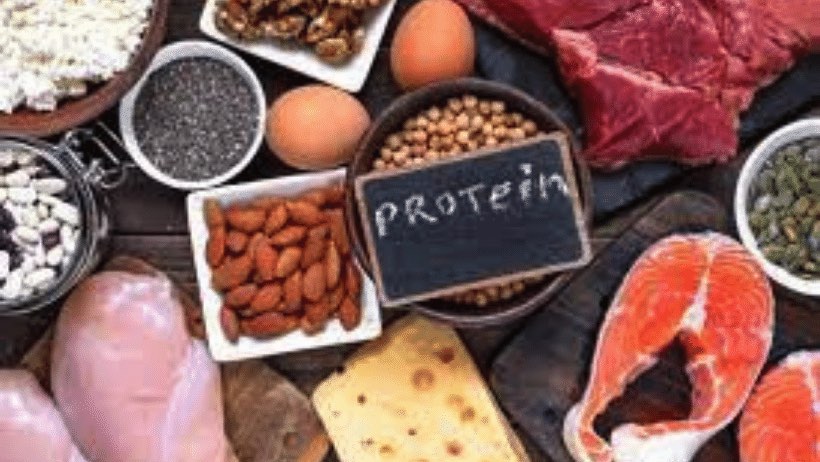
A protein is made up of amino acids, which are the building blocks of proteins. It is the amino acids that determine the structure and function of proteins. Aside from helping build cells and repair tissue, amino acids also form antibodies and transport oxygen throughout the body.
Amino acids essential for hair growth
It has been determined that the following amino acids are essential for hair growth:
- lysine: supports collagen synthesis as a restorative amino acid
- methionine: assists in the formation of pre-collagen, which develops into collagen
- cysteine: by providing sulfur to hair cells, it improves strength, elasticity, and texture of the hair
- arginine: supports blood circulation around hair follicles.
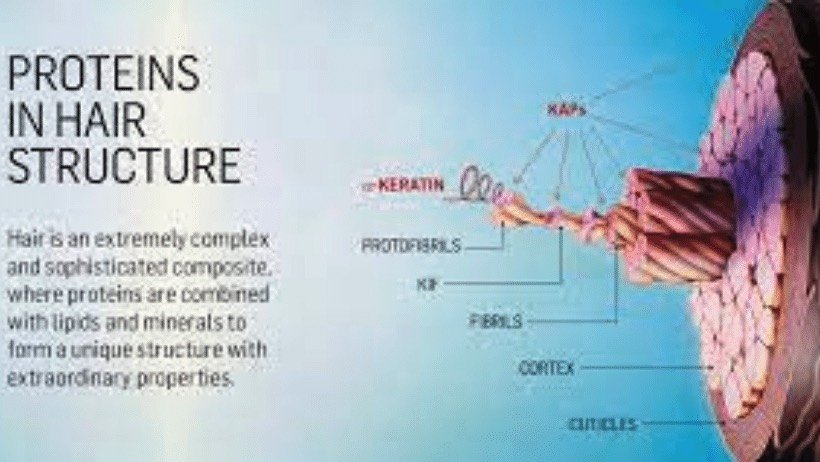
Hair health is important to many people, especially as they age. Foods with high nutritional value such as eggs, leafy greens, and fatty fish are good for hair growth. Nutritional deficiencies can affect the health of your hair.
The rate at which it grows and how healthy it is, however, depends on many factors, including age, overall health, genetics, environmental exposure, medications, and diet. You may not be able to change some factors, such as age and genetics, but your diet is likely something you can control.
The growth cycle of hair follicles and cellular turnover is influenced by vitamins and minerals in food. Hair loss can be caused by a diet that lacks the right nutrients. It has been found that deficiencies in vitamins B12 and D, biotin, riboflavin, iron, and other nutrients may contribute to hair loss. →
Nutritional factors and hair loss
A balanced diet rich in proteins, vitamins, and minerals can promote hair growth, particularly if you’re experiencing hair loss due to poor nutrition. The connection between micronutrients and hair loss needs more research, but you should ensure you’re getting enough of these foods rich in nutrients that promote hair growth.
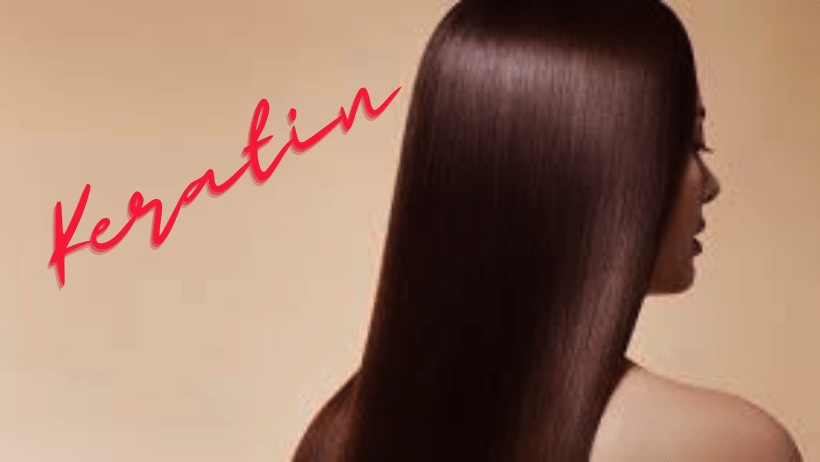
In the scientific world, amino acids are known as the “building blocks” of proteins. They assist your body in performing its functions. Amino acids (such as cysteine and L-lysine) play an important role in maintaining your hair’s health. However, you don’t need to take them as supplements. A healthy diet should provide you with plenty of amino acids. A few of the best food sources include fish, eggs, seeds and nuts, cottage cheese, whole grains, and meat.
Here are a few of the most important proteins, amino acids, minerals and vitamins for your hair and skin.
Biotin
Because biotin (vitamin B7) is essential for the production of keratin, biotin supplements are often marketed for hair growth. It has also been shown that people with a biotin deficiency can benefit from consuming more biotin. There are numerous foods that contain biotin in small amounts. A deficiency of biotin caused by pregnancy, long-term tube feeding, malnutrition, or rapid weight loss can be prevented and treated with biotin. As well as treating hair loss and brittle nails, seborrheic dermatitis in infants, diabetes, and mild depression, it is used orally.
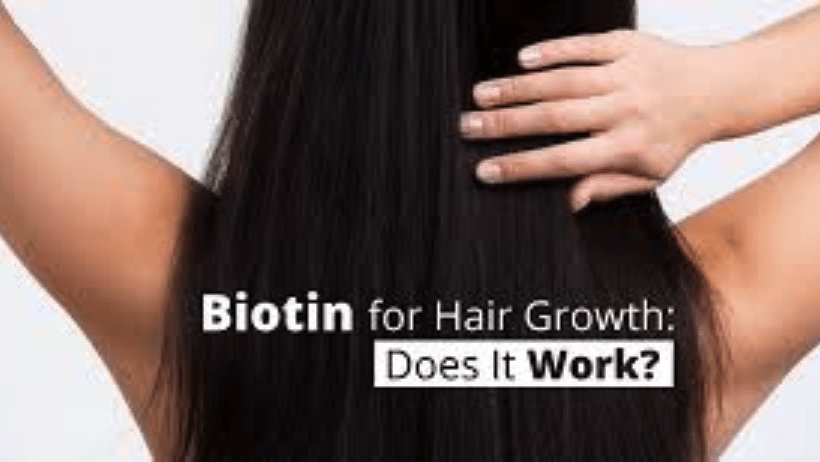
Keratin
The protein keratin is found in the upper layers of the skin, hair, and nails, and in the feathers, horns, and hooves of animals. Keratin treatments make hair stronger and less likely to break by replenishing lost keratin in the hair shaft. The strands are less likely to break, so some people may be able to grow their hair longer. Due to its high sulfur content, keratin is unusual in that most of its sulfur is contained in the amino acid cystine (L-Cys).
Cystine
The keratin of human hair contains more cystine (L-Cys) than any other protein. Hair is composed of keratin, a protein containing a high level of cystine. Disulfide bonds of cystine cross-link adjacent protein chains within the hair fiber structure, giving hair its mechanical strength. Cystine-fortified blends strengthen hair. The disulfide bridges formed by cystine give keratin its strength and rigidity.
Lysine
Lysine (L-lysine) also appears to play an important role in hair loss. A significant proportion of women with increased hair shedding responded to lysine and iron therapy in an open study with double-blind data. As a “building block,” lysine helps build muscles with dietary protein. In addition, it promotes bone health by improving calcium absorption. It was found that L-lysine, an essential amino acid that might contribute to iron and zinc absorption, may play a role.
Iron
Iron is a crucial nutrient for the production of blood, and low levels are associated with hair loss. You may be suffering from an iron deficiency if you’re losing hair. Although the reason for this isn’t clear, make sure you eat plenty of iron-rich foods like meat, fish, poultry, tofu, broccoli, and many greens. Research over the past 40 years shows that iron deficiency is much more closely linked to hair loss than most doctors realize. This may be the key to restoring hair growth. A protein called ferritin is important for iron storage. In general, the less ferritin in the blood, the less iron the body stores.
Zinc

Zinc is an essential component of most biological processes, so it’s no surprise that it strengthens the follicles beneath your scalp that nourish your hair. It cannot be stored in your body, so you must consume it every day. There’s some evidence that zinc supplements could help with hair loss if your levels are low. In the process of growing and repairing hair tissue, zinc plays a vital role. As well as keeping the follicles healthy, it keeps the oil glands functioning.
Selenium
Selenium is a nutrient found in some hair growth supplements. In addition to keeping your hair follicles healthy, it helps your body fight off any toxins you’re exposed to (such as from smoking or unclean air). Although rats and mice with low selenium go bald, this hasn’t been proven for humans. In fact, too much selenium can lead to hair loss and memory problems. There has been a connection between hair loss and certain nutrients (such as selenium, vitamin A, and vitamin E). →
Protein-rich foods for healthy hair and skin
Eggs
Protein from eggs is important for preventing hair loss. Diets low in protein can cause hair loss and reduce hair growth by putting hair growth in a “resting” phase. A B7 vitamin called biotin is also found in eggs, which is important for the health of hair, skin, and nails. In order for hair to grow, it is essential to consume enough protein. The follicles of the hair are largely composed of protein. Diets low in protein have been shown to cause hair loss.

Other nutrients that are good for hair can also be found in eggs, including zinc and selenium. It is for this reason that they are one of the best foods to consume for optimal hair health. Protein is an essential component of hair follicles, which promotes hair growth. Several studies have shown that a lack of protein in the diet is associated with hair loss. →
Berries
The growth of your hair depends on fruits, especially acidic ones. Antioxidants and vitamins found in berries contribute to shiny, stronger hair, according to a recent study. In terms of nutrient power, no other fruit can match this super fruit. Because vitamin B6 plays an important role in protein metabolism, berries support healthy hair growth. Furthermore, vitamin B6 ensures that hair cells have access to amino acids (building blocks of protein).

Berries contain beneficial compounds and vitamins that may support hair growth. There are many antioxidants in this group, including vitamin C. Antioxidants protect hair follicles from free radical damage. The body and the environment contain these molecules naturally. As an example, 1 cup (144 grams) of strawberries contains 85 milligrams of vitamin C or up to 113% of your daily requirements. Vitamin C also promotes collagen production, a protein that prevents hair from becoming brittle and breaking. →
Fatty fish
Salmon, herring, and mackerel are fatty fish rich in nutrients that may promote hair growth. Omega-3 fatty acids found in them have been linked to hair growth in several studies. Proteins, selenium, vitamin D3, and B vitamins are all nutrients found in fatty fish that may support strong and healthy hair. Taking a supplement containing omega-3 and omega-6 fatty acids and antioxidants reduced hair loss and increased hair density in 120 women. →
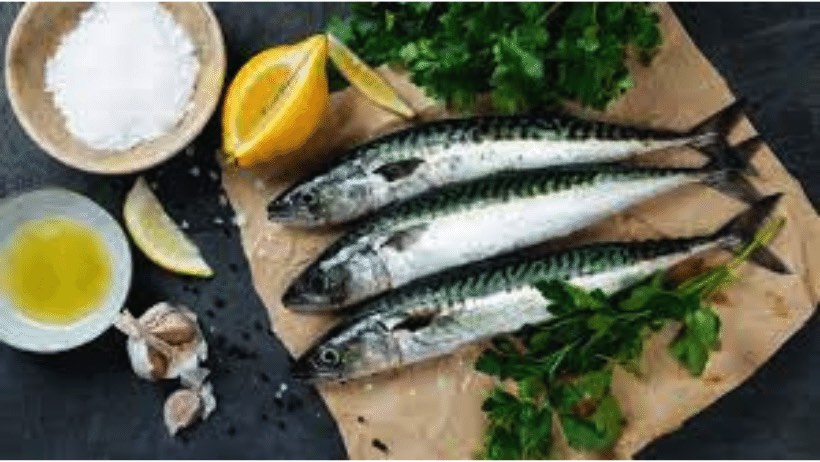
The best source of protein is fatty fish protein. Aside from its high protein content, fish is also carb-free. In addition to helping you lose weight, it is helpful to get rid of sugar and starch cravings when you are on a low-carb diet. Consider including fish in your healthy eating plan if it is not already part of it. Fish may be a good way to add protein to your diet and improve your health at the same time. A low-fat and omega-3-rich protein, it is among the healthiest around.
Oysters
Oysters contain 9 grams of protein per 3.5-ounce (100-gram) serving, making them an excellent source of protein. In addition, they provide all nine essential amino acids your body needs. The mollusks are also a good source of omega-3 fatty acids, a family of polyunsaturated fats that play a number of important functions in your body, such as helping heart and brain health, protecting against type 2 diabetes, and regulating inflammations.
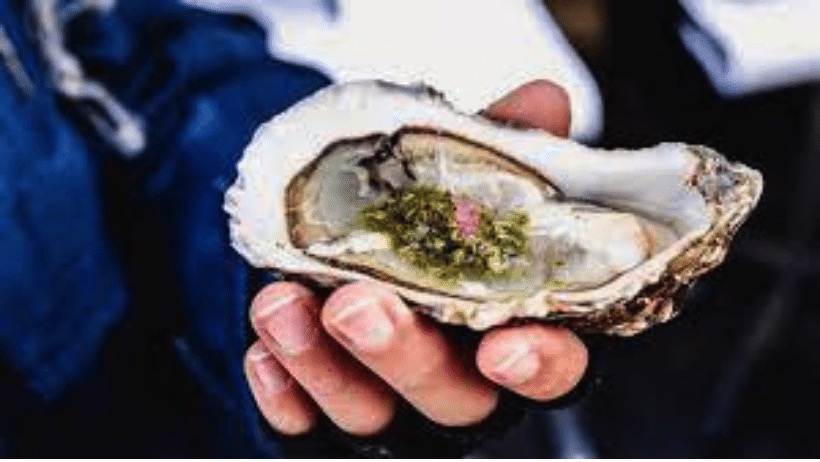
There are few foods that can provide you with more zinc than oysters. A medium oyster provides up to 96% of a woman daily zinc requirement and 75% of a man. During the hair repair and growth cycle, zinc plays a crucial role. A lack of zinc in the diet can lead to telogen effluvium, a common but reversible form of hair loss. Zinc supplements may prevent hair loss caused by zinc deficiency, according to studies. →
Nuts
Nuts are a good source of plant-based protein. In addition to making a convenient snack, they can be added to many dishes to boost their protein content. By eating nuts, you can meet your protein needs, which are essential for building bones, muscles, and skin. It also increases fullness, helping you remain energized and satisfied.

A variety of nutrients are found in nuts that contribute to hair growth. In fact, one ounce (28 grams) of almonds supplies you with 48% of your daily vitamin E requirements. Additionally, they contain a variety of B vitamins, zinc, and essential fatty acids. Hair loss has been linked to deficiencies in any of these nutrients. A variety of other health benefits have also been linked to nuts, including reduced inflammation and a reduction in heart disease risk. →
Beans
Beans are an excellent plant-based source of protein, which is essential for hair growth. Protein content in beans ranges from 21 to 25 percent by weight, which is much higher than in other vegetable proteins. Moreover, beans are inexpensive, so you can include them in your diet as an inexpensive way to eat nutrient-dense, high-protein foods. Among the amino acids found in beans is the amino acid lysine, which is used by the body to make hair, skin, muscles, bones, and blood.

As with oysters, beans provide zinc, which aids hair growth and repair. In just 3.5 ounces (100 grams), black beans provide 14% of a woman’s daily zinc requirements and 10% for men. Furthermore, they are rich in folate, biotin, and iron, which are all essential nutrients for healthy hair.
Soybeans
Soybeans provide high-quality protein, which is lacking in most other legumes, making them an ideal source of protein for vegetarians. Glycinin and conglycinin make up approximately 80% of soybean protein content. There are many forms of soy, each with different nutrients and health benefits.
Soy contains protein and fiber, as well as vitamins, minerals, and amino acids. It is low in cholesterol and contains some unsaturated fat. Researchers have found that soybeans contain compounds that promote hair growth. Among these compounds is spermidine, which is abundant in soybeans. According to a study of 100 people, spermidine-containing nutritional supplements prolonged anagen phase hair growth. The longer a hair follicle remains in the anagen phase, the longer it will grow. →
Meat
Proteins from meat are an important source of nutrition for humans. Protein-rich foods such as meat, poultry, fish, eggs, and dairy products contain complete proteins, while fruits, vegetables, grains, nuts, and seeds lack one or more essential amino acids. However, it’s important to note that too much red meat consumption, particularly processed red meat, is linked to cardiovascular disease, colorectal cancer, and type 2 diabetes.
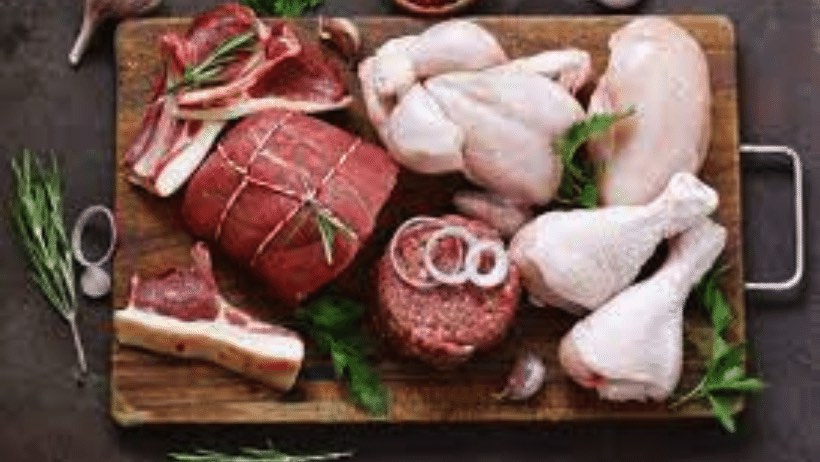
Meat is an important part of many people’s diets and is packed with nutrients that may promote hair growth. Hair follicles are repaired and strengthened with the help of protein in meat. Especially red meat is rich in a type of iron that is easy to absorb. Among other things, this mineral aids in the delivery of oxygen to your body’s cells, including your hair follicles. →
Conclusion
Your hair’s health can be affected by what you eat. Vitamin A, C, D, and E, zinc, B vitamins, iron, biotin, proteins, and essential fatty acids may slow down hair growth or even lead to hair loss if you don’t get enough of them. The good news is that correcting a deficiency in any of these nutrients can promote hair growth and treat hair loss. Make sure your diet contains some of these foods if you feel you’re lacking any of them.
Read also
Sources
https://www.healthline.com/nutrition/foods-for-hair-growth
https://www.thezoereport.com/beauty/amino-acid-benefits-for-hair
https://www.webmd.com/beauty/features/keratin-hair-straightening-treatments
https://www.rxlist.com/keratin/definition.htm
https://www.healthline.com/nutrition/best-vitamins-hair-growth
https://www.aad.org/public/diseases/hair-loss/treatment/tips
